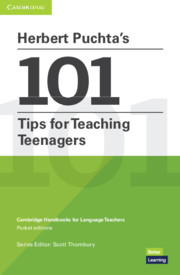 Herbert Puchta's 101 Tips for Teaching Teenagers
Herbert Puchta's 101 Tips for Teaching Teenagers Book contents
D - Listening
Published online by Cambridge University Press: 28 October 2023
Summary
Understanding a new language can be a huge challenge, especially for those whose sense of self-esteem is fragile. This is why we need to help our learners get into a focused yet relaxed state of mind, and one in which they feel ready to understand the gist of a text, whether fact or fiction, without an inner voice telling them they can't do it. Listening with a partner, interactive listening activities and listening games are just some of the scenarios we can provide to develop a range of strategies that help with listening tasks.
34 Teach learners to listen out for keywords
35 Use storyboards with narrative texts
36 Use various ways of dictating texts
37 The super statement challenge
38 Motivate learners to listen attentively to each other
39 Try Rogerian listening to improve communication in class
40 Use collective listening to raise learners’ level of attention
41 Encourage learners to record their voice
42 Ways of supporting intensive listening
34 Teach learners to listen out for keywords
Having to understand the main ideas in demanding texts can be stressful for teens, and that can block their comprehension.
I have used the following strategies to help learners become focused yet relaxed while listening:
• Give learners a handout with a word cloud of, say, 10 to 12 keywords from the listening text, including two or three words that are not. Give them a few minutes to create sentences using the words.
• Tell learners you’re going to play an audio text or a video. Ask them to listen/watch and circle the words they hear. Ask learners to work in pairs and create a short summary of the audio/video, drawing on the keywords and their memory.
• Then, ask the pairs to list some questions they have about the content. Ask them to call them out. Write the questions on the board and play the audio/video again.
• Ask learners for any specific comprehension problems. If there are any words, phrases or sentences they don't understand, play the relevant parts of the audio several times so they get a chance to understand without stress. Praise them for their effort in listening several times.
I have successfully used another variation of the keywords technique when revising stories.
- Type
- Chapter
- Information
- Herbert Puchta's 101 Tips for Teaching TeenagersCambridge Handbooks for Language Teachers Pocket editions, pp. 37 - 46Publisher: Cambridge University PressPrint publication year: 2020


